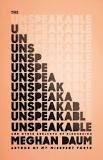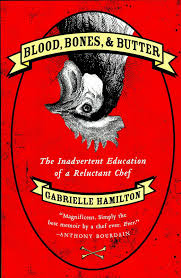
Writers as entertaining, vulnerable, and clever as Meghan Daum are rare, and a tome of essays that tickle the wit and heart like The Unspeakable: And Other Subjects of Discussion is a fine treat for a train ride. Daum starts out unapologetically from the first page with a description of her mother dying while the writer was distracted by an article in Vogue—and doesn’t let up from there. I read it in a single afternoon while on VIA Rail traveling from Vancouver to Jasper.
Her essays run the gamut from slightly sickening (“Matricide”) to name-dropping (“The Joni Mitchell Problem” and “Invisible City”) to altruistic (“Difference Maker”) and oddly heart-rending (“Not What it Used to Be”, and frankly, all of the above). In turns confessional and self-objective, she ponders and challenges ideas about sentimentality and authenticity. Her intro posits: “We like the idea that everything happens for a reason. When confronted with the suggestion that life is random or that suffering is not always transcendent we’re apt not only to accuse the suggester of rudeness but also pity him for his negative worldview.” As she goes on, she discovers that the sentiment of the everyday can only be spoken about “in coded terms”—things like maybe not loving your parents enough, or thinking that the most enjoyable parts of life feel like chores are rarely talked about, if at all.
“It’s about the unspeakable acts that teach no easy lessons and are therefore elbowed out of sight.” I loved The Unspeakable about as much as I did Daum’s 2015 release, Selfish, Shallow, and Self-Absorbed: Sixteen Writers on the Decision Not to Have Kids (more on that title some other time).
Best bits: Daum’s coming to terms with not wanting children, despite her husband’s aptitude and desire for fatherhood. It made me sob. Alone. In a traincar bathroom.
The charades game at Nora Ephron’s house is hilarious, as is an incredibly awkward moment for Nicole Kidman.
Finally, her ongoing shuffle between femininity and butchness described in “Honorary Dyke” is an anthem for tomboys and femme-friends alike.

 Gabrielle Hamilton’s Blood, Bones and Butter: The Inadvertent Education of a Reluctant Chef is near perfect, in my mind, when it comes to food-writing and memoir. This has so many things I love in a book, but mainly that it’s by a smart, ferocious lady who has a tendency to associate love with eating.
Gabrielle Hamilton’s Blood, Bones and Butter: The Inadvertent Education of a Reluctant Chef is near perfect, in my mind, when it comes to food-writing and memoir. This has so many things I love in a book, but mainly that it’s by a smart, ferocious lady who has a tendency to associate love with eating.